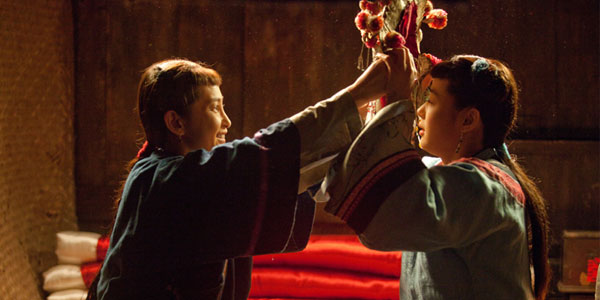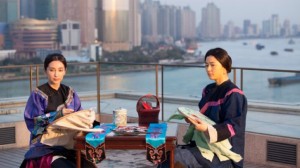
When I first saw the trailer for Snow Flower and The Secret Fan, I had horrifying fears that this film would be Joy Luck Club 2: Asian Women Being Oppressed by Asian Culture (Again) since it was also directed by Wayne Wang. Words can’t quite describe how much I dislike Amy Tan’s book and the film adaptation, even though I am aware that it is one of the few instances where a Hollywood production used a primarily Asian cast. In some ways, Joy Luck Club was a breakthrough film that gave many of the Asian actresses more work.
Countless essays and conversations have been had about Joy Luck Club and most of you know may know them as well: Asian culture used as a clutch to show barbaric and savage it is, Asian men are nothing but misogynistic, cold-hearted pigs, and white men being misunderstood saviors to poor oppressed Asian women. I acknowledge all three problems for that film but my biggest problem is that every the characters would reveal a traumatic moment, they stare off into space with such deep thought. At at one point in my college years, I made a drinking game that for every deeply pensive look, we took a shot of vodka. Suffice to say, we were wasted halfway through the film.
But I digress. We are here to talk about Wayne Wang’s latest film, Snow Flower and the Secret Fan and how he has evolved since then.
I am very pleased (and surprised) to say that this film is not Joy Luck Club 2, as I thought it would be. A lot of credit may have to go to Lisa See’s book, and although I haven’t read it, a lot of my colleagues have reassured me it’s quite good. If that is to be the case, then it translated quite well onto the silver screen because I came out of the press screening a week ago enjoying this film far more than I previously anticipated.
For starters, I was completely taken in by the two leads, played by Gianna Jun and Li Bing Bing, who are best friends bonded together by laotong, a life-long contract of loyalty. Their modern day counterparts were well woven into their mirrored story of Snow Flower and Lily in the 19th century. Their relationship was not only completely believable, but was the heart and soul of the movie.
But you usually don’t have a Hollywood-staple production without having a white actor in it somewhere. There was a huge surprise cameo played by Wolverine himself, Hugh Jackman. I was at first nervous that having such a huge star in this film would be a large distraction and worse, that he would play the oh-so familiar white knight in shining armor. Thankfully, this was not the case as he actually was a rather flawed and three dimensional character who played a nice, subtle role to this story without drawing the focus away on the two sisters. It was also a nice touch to see him singing. I have to say, Hugh Jackman can sing.
 The ancient Asian cultural elements were handled rather gracefully. Although it seemed a bit showy and exotic at times, the film makers clearly paid a lot of time and attention to research on the world as I never felt like they were just showing certain Asian elements for cheap entertainment purposes. Even the problematic notion of foot binding was handled subtly. While it didn’t glorify this rather painful process, it didn’t demonize it either and tell audience members that Chinese people are barbaric savages for doing something like this. After all, white people had to wear corsets during the 19th century so it’s safe to say that no matter what country you’re in, people have really strange and painful ways to determine what is beauty to them.
The ancient Asian cultural elements were handled rather gracefully. Although it seemed a bit showy and exotic at times, the film makers clearly paid a lot of time and attention to research on the world as I never felt like they were just showing certain Asian elements for cheap entertainment purposes. Even the problematic notion of foot binding was handled subtly. While it didn’t glorify this rather painful process, it didn’t demonize it either and tell audience members that Chinese people are barbaric savages for doing something like this. After all, white people had to wear corsets during the 19th century so it’s safe to say that no matter what country you’re in, people have really strange and painful ways to determine what is beauty to them.
Hollywood tends to have a fickle of a time portraying Asian men as normal human beings, even with an Asian director at helm. I am somewhat relieved to say that this film does not portray them in such an awful light like Joy Luck Club did. Well, it still wasn’t that great as the Asian men in the ancient times were either incapable of having sex or a complete brute who wanted nothing BUT sex. But hey, Archie Kao was in it for the modern sections, and although unfortunately he did not play the love interest for Li Bing Bing’s character, the actor exudes charisma and sexiness in everything he does. So I’ll take that as a slight win.
It was definitely a nice touch that two Joy Luck Club alumni were involved in this, with guest appearances by Russell Wong and Vivian Wu. The music was done by returning Joy Luck Club composer Rachel Portman and while it was good for the most part, it did tend to get a tad irritating. An hour in as the music would sound the same over and over again.
On a final note, the biggest thing that won me over with this film was that it did not take every single moment to be so freaking significant when a character got emotional. No more staring off into space, no more overly exaggerated emotional weepy moments. The film certainly had heavy significant moments, but it didn’t seem forced.
I would definitely recommend checking out Snow Flower and the Secret Fan, especially if you’re a fan of the book. If you’re a fan of Wayne Wang, check it out. If you’re a fan of Joy Luck Club (insert sigh), check it out. If you just want to watch a good film, then do yourself a favor and check it out.
Snow Flower and the Secret Fan opens in select theaters this Friday, July 15th, in Honolulu, Los Angeles, New York, San Francisco, Toronto, and Vancouver. Over the next few weeks after that, it will be having an expanded release so keep your eyes peeled if this film is playing in your city. It’s certainly worth it.








